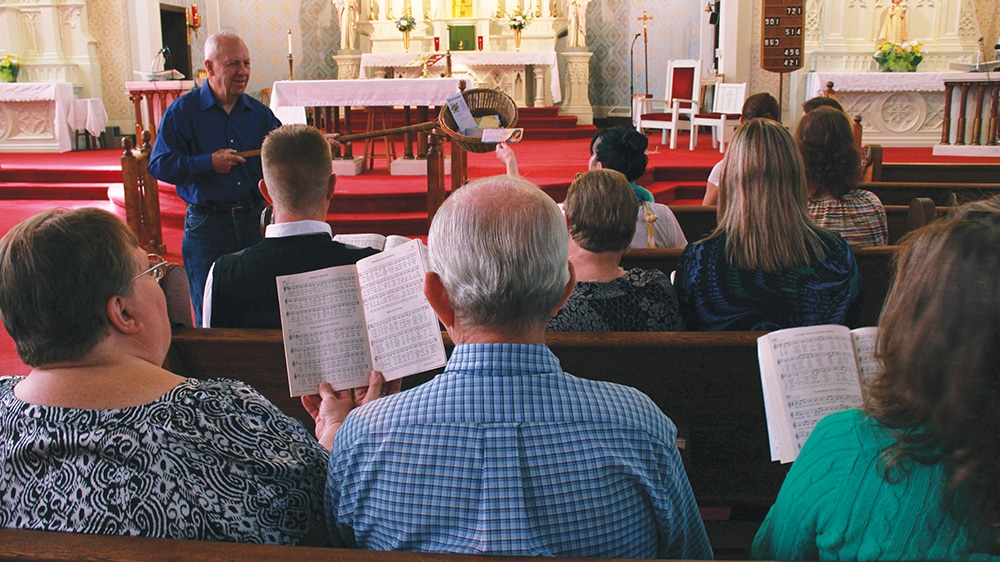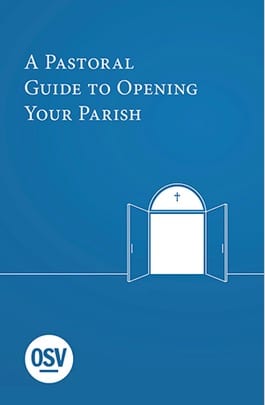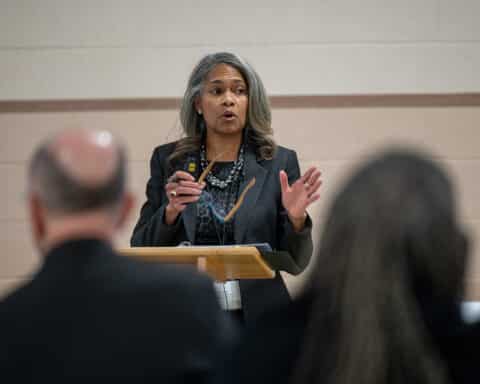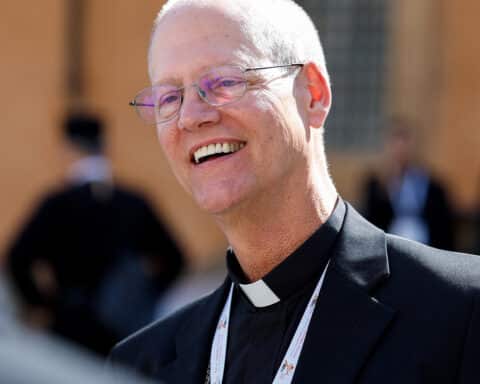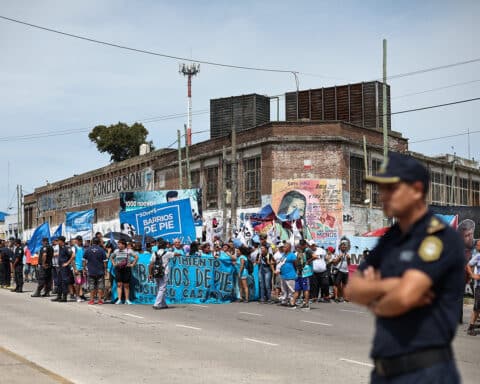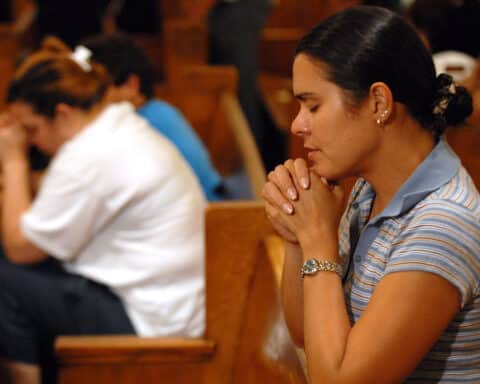The word most often used to describe the COVID-19 pandemic is “unprecedented,” which is a soft-peddled way to collectively admit we have no road map.
Thankfully, however, there are three fundraising principles that I’ve learned over the last 30 years that I present to parishes to consider in their attempt to recover from financial distress during this difficult period. Time and again, in a wide range of circumstances, I’ve applied these principles in my work with Catholic parishes, schools and apostolates.
| Booklet |
|---|
|
This article is included in “A Pastoral Guide to Opening Your Parish,” a new booklet from OSV. As our parishes begin to reopen following local guidelines, the Catholic faithful have many questions and legitimate concerns about what life will look like post-pandemic, and we hope this booklet helps give parish leaders a playbook to welcome back parishioners following the shutdown. For more information, or to order, click here.
|
Principle No. 1: Relate to donors as friends, and they will respond in kind
Think of donors as though each were a very good friend. Now think about how one relates to friends. What are the most basic expectations of friendship?
The first is honesty. One might think this goes without saying. But when it comes to fundraising, I am surprised at how often parish leaders don’t treat donors as friends — with bare-bones honesty. I’m not implying deception is undertaken, but rather there are subtle ways we communicate that risks leaving donors suspicious of not being entrusted with the “full story.”
Read more from our special section ‘Moving Forward in Faith’ here
The second expectation is emotional investment — empathy. Parishioners need to feel that the pastor and parish leadership recognize and appreciate difficulties they themselves may be facing.
In that light, let me offer some dos and don’ts regarding communication with parishioners.
Do acknowledge that people are financially hurting.
Think about the conversations you are having these days with friends. The first words via phone or text are likely, “So, how are you doing?” These words have more significance now. It’s no longer just a throwaway greeting or rhetorical question. We really want to know. I hear it in people’s voices. There is genuine concern.
Communication to parishioners must evoke the same sense that someone cares. In any effort to raise money, you will want to acknowledge the fact that many people are hurting financially.
Don’t allow the fact that people are hurting to become an excuse to do nothing.
Imagine a group of 10 lifelong friends. A tornado sweeps through town. Three friends lose their houses completely, two have roof damage, one lost his garden shed, and the remaining five were fortunate to avoid loss. Wouldn’t those that had little or no damage want to do something to help the others? Would they not rally to help friends most in need?
Coming out of the pandemic, allow this example of friendship to inform your approach to fundraising. You might say: “Yes, a lot of people are financially hurting. But if you are among those who have been able to weather the storm — if God has blessed you — this is a time of grace when you can bless others.”
The idea is that we all go through tough times in our lives. Even before the pandemic, there were occasions when even the most faithful donors had to reduce contributions while others carried the burden. Unfortunately, a lot of parishioners are now in this circumstance at once. That means those who are able have an even more important role to play in the life of the parish.
Don’t use guilt to promote giving.
When asking, be careful about wording the request in a way that engenders guilt, even subtly.
In nearly every parish where I’ve led a fund drive, someone on the parish council inevitably joked about the need to “hit them with a little Catholic guilt.” Guilt never motivates one’s best giving. Rather it engenders bitterness because one feels an underlying manipulation. That’s not how one treats friends.
The use of guilt happens in subtle ways. For example, in an effort to motivate gifts for church repairs, I’ve seen pastors remind parishioners, “You worship in a church built by the generation before you.” The implication: Now it’s your turn to pay the piper.
On face value, it doesn’t sound bad to remind people of others’ sacrifice. But if not carefully worded, it can be taken the wrong way. Think about what is implied but not stated: To remind me that I’ve worshiped all these years in a historical church that someone else paid for — you might as well say it’s time to stop being a deadbeat! That’s how it feels to some people.
Bottom line: When communicating to parishioners, check your language to see if it includes even a subtle jab at engendering guilt.
Do focus on gratitude.
The best gifts come from people filled with gratitude. To continue our example, you could use the same facts surrounding the historical church but present them in a way that promotes gratitude. “Every week we see the statement of faith left to us in the beauty of our church and these precious stained-glass windows … .” That feels better, because it leads people to appreciate something that they may have taken for granted. It allows God to prompt their heart. It calls them to think about their own children and grandchildren and what they want to leave to the next generation.
Gratitude is the right motivation for giving. The pandemic has caused a lot of heartache and financial worry. At the same time, we have seen kindness from strangers, courage from health workers, and — for most — at least some financial relief from the government. (In addition, the vast majority of us have so far sidestepped the illness.) Yes, many people are hurting. But let’s not overlook the quiet blessings of family and faith for which we can be thankful.
Don’t beat around the bush.
If you had a need, how would you ask a friend for help? You might simply say, “I need to ask a favor.” The beauty of friendship is that the relationship allows you to be blunt when you need to be.
I’ve done more than 4,000 major gift-solicitation calls, and I’m convinced donors appreciate this approach. In fact, many of them will take the appointment requested and begin the conversation by asking, “What do you need?”
Do tell them what you need.
The entire economy has been affected by the pandemic. People assume their parish has been negatively impacted. The only question is, “to what extent?”
It’s incumbent upon the pastor, in concert with staff and the parish finance council, to have an answer to that question. That leads to the second principle.
Principle No. 2: When you know what you need, you will get what you need
When asking for money, the first two questions on the mind of the prospective donor are: “How much do you need?” quickly followed by, “What for?”
When leading a fund drive, these are naturally the first questions I ask parish leadership. To my continual amazement, it’s not uncommon to be given vague answers to one or both questions. Thankfully, I’ve also worked with wise, seasoned pastors. They know that when they are clear about the community’s needs, the community responds.
Don’t be vague in expressing the need.
It’s not enough to say, “Being closed for six weeks, donations are down, and your help is needed.” They have presumed that already. Friends want to know what it will take to right the ship.
Do provide detailed information.
The pastor should ask his business manager and/or finance council to quickly prepare a few easy-to-communicate facts for the parish. For example: “Typically, the Sunday offertory for April would total $70,000. We budgeted for $68,000. This year, because of the closure, April gift revenue was $40,000. That is a significant drop. Still, we are thankful to the many families who continued to give through direct deposit.”
You might go on to explain, “Facilities expenses are down by $4,000 because of the closure, which offset some of the loss of revenue.” That completes the picture, because budgets are always a combination of income vs. expense. To say that expenses are down also helps soften the unsettling but necessary news.
Do have a call to action.
After your concise report of the parish’s financial situation, there must be a call to action. What are you asking me, the parishioner, to do? Sensitivity is in order since unemployment is widespread. But recall our analogy of friends surviving a tornado. As a leader, what are you asking friends to do for friends?
It may be reminding people that direct deposit donations have been a godsend during this crisis and inviting others to join the rebuilding effort in regard to their means. Then tell them how they can sign up for direct deposit and make it convenient for them to do so.
This is just one example. Pastors should rely on their finance council to provide good information followed by a call to action that includes specific ways people can support the parish financially.
Do use this crisis to be forward-looking in parish finances.
In recent years, I have grown alarmed at the proportion of the Sunday offertory attributable to retirees. Case in point: In one parish we worked with, nearly a quarter of the budget came from people who had outlived their life expectancy. Meanwhile, families under the age of 50 accounted for less than 10% of gift revenue.
What are the statistics at your parish? Do you know? If not, now would be a good time to ask a staff member or trusted finance council member to do an analysis of gift revenue. The pandemic may linger for months, possibly years, and we know COVID-19 disproportionately affects the elderly.
If your parish faces financial risk, the sooner you know the possible extent, the more time you will have to plan a response.
Principal No. 3: Remember that almsgiving is a spiritual act
Catholic organizations have followed the lead of other nonprofit entities in asking for support on a transactional basis. The request plays out like this: “Look at all the wonderful things we do; therefore we have earned your support.”
There is some validity in this thinking, in that charities are called to be good stewards of people’s gifts. But that sells short the idea of what God has in mind for almsgiving and sacrifice. Recall the ancient Jews offering their burnt sacrifice. At a time when every morsel of food was precious, they simply took a portion and offered it to God. Food went up in flames, with no material benefit to anyone, including the hungry. Why would God ask such a thing?
It was an act of abandonment to God’s providence that required faith and trust. Is this not the lesson pressing upon us at this moment? Help parishioners transform their donations into true almsgiving. Explain that almsgiving goes beyond the transactional; it is not an exchange of money for some good thing. Rather, done as an act of detachment like the ancient Jews, true almsgiving requires an interior conversion of heart.
This is a disposition of the soul that takes time to achieve. But those who do will long express their gratitude for your friendship, for caring enough to teach them that detachment was the very thing needed for interior peace in this time of uncertainty.
Gregory S. Jeffrey is the founder of Catholic Development Group (catholicdevelopment.com).

